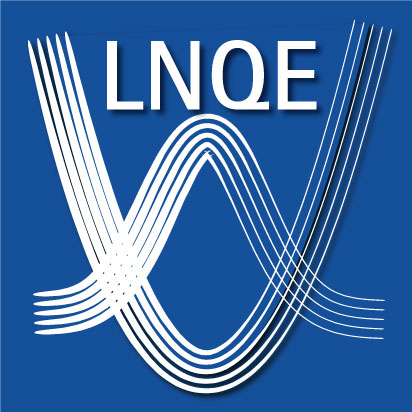Quantum computers promise unprecedented computing power for applications where computers based on "zeros and ones" fail in principle. In the project "Quantum Computers with Stored Ions for Applications" (ATIQ), 25 partners from research institutions are now working with industrial partners to develop quantum computer demonstrators that will be realized together with users of quantum computers. In doing so, the partners are tackling major technical challenges to realize German quantum computer demonstrators and make them accessible to users in 24/7 operation. The Federal Ministry of Education and Research is funding the project with a total of 37.4 million euros.
The goal of ATIQ is to develop within 30 months a first generation of reliable, user-friendly and round-the-clock available quantum computer demonstrators based on ion trap technology. To this end, the leading groups in ion trap research at the universities in Hannover/Braunschweig, Siegen and Mainz have joined forces with research institutions and industrial partners. "We want to take the next big step together. ATIQ is intended to be the crystallization point for a German ecosystem of ion trap quantum technology that brings together technology partners, science and users and leads to relevant commercial exploitation," says project coordinator Professor Christian Ospelkaus of Leibniz University and the Physikalisch-Technische Bundesanstalt Braunschweig, summarizing the motivation.
Instead of classical bits, a quantum computer uses qubits. "Ions are ideal qubits. They are provided to us by nature itself, are always identical, and their properties are also known with the highest accuracy. Within ATIQ, we will explore new methods to control these perfect qubits even in large quantum registers," says Professor Christof Wunderlich from the University of Siegen. "Especially if you combine a classical high-performance computer with such a quantum coprocessor, this team is unbeatable for new computing tasks" adds Professor Ferdinand Schmidt-Kaler from the University of Mainz.
Robust and scalable quantum hardware
ATIQ indeed holds enormous potential for economic and scientific success. Quantum computers promise unprecedented computing power for applications where purely digital classical high-performance computers alone fail completely. The combination of classical high-performance computing and quantum computing, on the other hand, opens up completely new possibilities. There is therefore an urgent need for Germany to provide robust and scalable quantum hardware. The ATIQ consortium aims at optimized hardware for applications in chemistry. Novel chemical substances and the reactions to produce them could then be simulated on quantum computers. Another use case is in finance, where completely new approaches are being taken in credit risk assessment.
The core of the quantum processor in ATIQ is based on ion trap technology, which is regarded worldwide as one of the most promising routes to quantum computing. However, current systems are complex laboratory machines, continuously maintained and calibrated by highly skilled personnel. ATIQ addresses the technical challenges to manage continuous operation with reliable high quality computing operations. For this purpose, the ATIQ partners, in cooperation with technology and industry partners, optimize the control of the processors with electronic and optical signals so that external users can also execute computing algorithms independently. In addition, such optimization also promises the upscaling of the quantum demonstrators from an initial 10 to eventually more than 100 qubits.
The strength of the consortium is based on the knowledge as developers of ion trap technology and the physical and technical fundamentals at the universities and research institutions Leibniz University Hannover / PTB Braunschweig, the Johannes Gutenberg University Mainz, and the University of Siegen together with other research institutions, strong industry and technology partners as well as users and associations such as Quantum Valley Lower Saxony.
About the project
The joint project "ATIQ - Quantum Computers with Stored Ions for Applications" is part of the BMBF funding measure "Quantum Computer Demonstration Setups". Project duration is from December 1, 2021 to November 30, 2026, the project volume is 44.5 million euros (funding amount 37.4 million euros plus own contribution of the participating companies). In total, the competencies of 25 partners are bundled in ATIQ and coordinated at Leibniz University Hannover. Other partners are Johannes Gutenberg University Mainz, University of Siegen, TU Braunschweig, RWTH Aachen, Physikalisch-Technische Bundesanstalt, Fraunhofer-Gesellschaft, AMO GmbH, AKKA Industry Consulting GmbH, Black Semiconductor GmbH, eleQtron GmbH, FiberBridge Photonics GmbH, Infineon Technologies AG, JoS QUANTUM GmbH, LPKF Laser & Electronics AG, Parity Quantum Computing Germany GmbH, QUARTIQ GmbH, Qubig GmbH and TOPTICA Photonics AG. Associated partners are AQT Germany GmbH, Boehringer Ingelheim, Covestro AG, DLR-SI, Volkswagen AG and QUDORA Technologies GmbH.
Note to editors
For further information please contact
- Prof. Dr. Christian Ospelkaus, Institut für Quantenoptik der Leibniz Universität Hannover, Telefon +49 511 762-17644, E-Mail christian.ospelkaus@iqo.uni-hannover.de,
- Prof. Dr. Ferdinand Schmidt-Kaler, Institut für Physik der Johannes Gutenberg-Universität Mainz, Telefon +49 6131 39 26234, E-Mail fsk@uni-mainz.de,
- Prof. Dr. Christof Wunderlich, Lehrstuhl Quantenoptik an der Universität Siegen, Telefon +49 271 7403757, E-Mail Christof.Wunderlich@uni-siegen.de
The project profile of the BMBF can be found at https://www.quantentechnologien.de/forschung/foerderung/quantencomputer-demonstrationsaufbauten/atiq.html










![[Translate to English:] Logo Zusammenland farbig](/fileadmin/_processed_/a/9/csm_zusammenland_4c_e78505eb7d.png)
![[Translate to English:] Logo Zusammenland-schwarzweiß](/fileadmin/_processed_/1/2/csm_zusammenland_sw_f06954e75c.png)